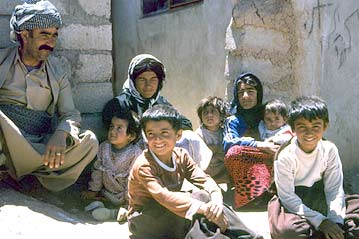Iraqi Kurds return through newly-opened border crossing
Iraqi Kurds return through newly-opened border crossing

ERBIL, Iraq, June 23 (UNHCR) - Eighty refugees returned to Iraq's mainly Kurdish north today as UNHCR and the Iranian government opened a newly-opened border crossing at Haj Omran to facilitate repatriation movements back to Iraq.
Wednesday's convoy left from Ziveh camp in Iran's West Azerbaijan province, which shelters some 3,300 registered Iraqi refugees.
The Iraqis had fled their homeland 15 years ago when Saddam Hussein's government started the brutal Anfal campaign that saw the bombing of entire villages and use of chemical weapons against civilians in northern Iraq. Kurdish communities were decimated and many hundreds of thousands of people were forced from their homes.
The Iraqi Kurds in Iran have long been seeking UNHCR's support to reopen the Haj Omran border crossing south of Orumieh near Piranshar city so that they could go home without having to take the more circuitous route via southern Iran, where the Shalamcheh border crossing links Khuzestan province with Iraq's Basra governorate.
"With the opening today of the northern Haj Omran border crossing, these Kurdish refugees have finally been given an opportunity to return home via a more convenient northern route," said Philippe Lavanchy, UNHCR's Representative in Iran. "We are very pleased that UNHCR can help ease returns for those people who really wish to go back to Iraq's three northern governorates."
The UN refugee agency does not promote returns to Iraq due to the fragile security situation, the absence of a functioning judicial system to adjudicate property disputes, as well as the severe strain experienced by vital public services like health care and clean water.
Nevertheless, due to the demands by anxious refugees to go home, the agency has so far facilitated the return of more than 6,600 refugees from Iran, mostly over the southern Shalamcheh border crossing.
As the situation in Iraq remains precarious, especially in the run-up to the June 30 handover of power, UNHCR staff in Iran interviewed all the refugees prior to their departure to ensure that they were aware of the security situation and that their return was voluntary and based on an informed decision.
Before crossing at Haj Omran border, Wednesday's refugees received mine awareness training from staff of the Ansar Relief Institute. Doctors from IRAC, a charity helping Iraqi refugees in Iran, were also on hand to address any health issues.
UNHCR staff in Iran also distributed a $20 grant to each person along with a return package containing a plastic tarpaulin, kitchen items, a cooking stove, jerry cans, blankets and mattresses to help the returning refugees re-establish their lives back home.
The returnees were met at the frontier by Iraqi officials and representatives of UNHCR's partner agency in the region, the International Rescue Committee (IRC), who helped to process the returning Iraqis.
A reception centre has been set up in northern Iraq, west of the border at Dyana, where the returnees received food, medical assistance and further mine awareness information from IRC and other non-governmental organisations (NGOs). Staff at the transit centre monitor the entire process and provide support and assistance to returnees at all stages of repatriation and reintegration.
Fifty-six of Ziveh camp's returning Iraqis were transported to Erbil, while the remaining 24 were taken back to Dohuk with the support of UNHCR.
"Despite the difficult security situation, refugees still choose to return to their hometowns," said Enda Savage, the UN refugee agency's Amman-based repatriation coordinator for Iraq. "It is encouraging and UNHCR will do its utmost to support the refugees along the way and upon arrival."
UNHCR is working with a number of NGOs and the UN's Office of Project Services (UNOPS) to facilitate the reintegration of returning refugees and displaced persons in Iraq's three northern governorates. Exiles returning from Iran will participate in these ongoing reintegration programmes.
So far, over 11,500 Iraqi refugees have returned in convoys facilitated by UNHCR from Iran, Saudi Arabia and Lebanon.
Roughly a quarter of the more than 200,000 Iraqi refugees who lived in Iran at the time of the collapse of the Saddam government in April 2003 were ethnic Kurds. More return convoys over the Haj Omran crossing are expected following the upcoming handover of power from the Coalition forces to the Iraqi authorities.







